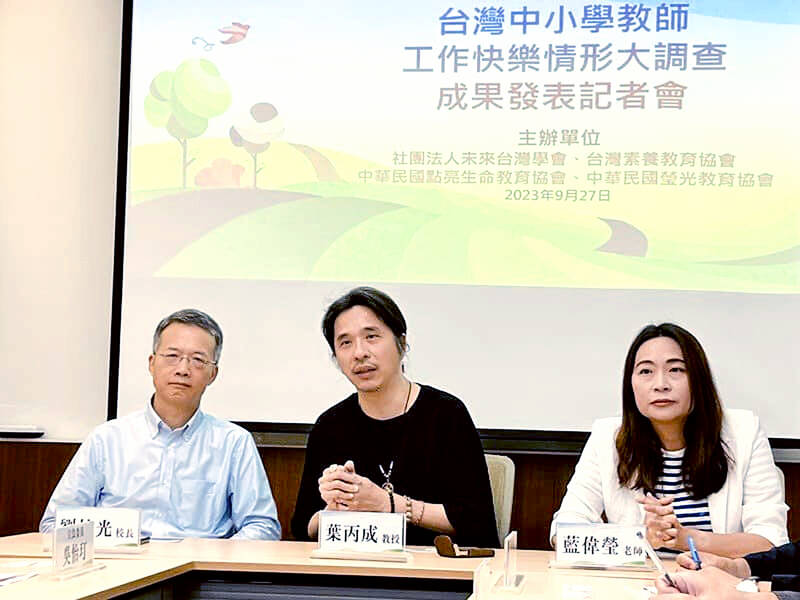A national survey found that 30.1 percent of elementary, junior-high school and high-school teachers were unhappy with their jobs — the most common cause being having to communicate with children for their parents.
The survey by Shi Hsin University’s Opinion Poll Research Center found that these teachers on average gave themselves a score of four or less on a 10-point happiness scale, suggesting deep unhappiness, the Future Taiwanese Education Society told a news conference yesterday.
Forty-one percent of teachers gave themselves a score of more than six, showing that a larger number of educators are satisfied with their jobs, a center spokesperson said.

Photo from Yeh Ping-cheng’s Facebook
The leading cause of unhappiness among teachers is being asked by parents to help with parent-child conflict, as educators consider this a responsibility of the child’s parents, the center said.
The second most significant cause of unhappiness among teachers are the unrealistic expectations parents and the government have, which result in an unreasonable workload, the spokesperson said.
That was followed by a fear of being falsely accused of mistreating or abusing children, the center said.
The government should seek to stamp out false allegations and help educators fighting to protect their reputation, society chairman Yeh Ping-cheng (葉丙成) said.
Government agencies too often demand that educators take part in policy initiatives without providing an action plan, guidelines or directives, while the Ministry of Education seems to accept the demands of other ministries with no care for the burdens placed on teachers, he said.
Kaohsiung and Penghu, Nantou, Miaoli and Changhua counties are the areas with the happiest teachers, but Chiayi City, Chiayi County, Tainan, Hsinchu City and Yilan County have the least happy teachers in the country, Yeh said.
A few areas were left out due to insufficient data, he added.
The distribution of teacher happiness seems to indicate that educators are happiest in rural regions and least happy in urbanized and developed areas, which could reflect the cultural differences in parents’ approaches to education, Yeh said.
Urban parents are more likely to demand their children get good test scores and turn the screws on teachers should their children fail to meet their expectations, he said.
Teachers tasked with managing a class or performing administrative duties were significantly less happy than those who were not, he added.
The society called on the Ministry of Education to reject other government agencies and offices’ bids to place unreasonable burdens on teachers, push harder for the digitization of paperwork, create realistic timetables for implementing policy and repair parent-teacher relations, he said.

Three Taiwanese airlines have prohibited passengers from packing Bluetooth earbuds and their charger cases in checked luggage. EVA Air and Uni Air said that Bluetooth earbuds and charger cases are categorized as portable electronic devices, which should be switched off if they are placed in checked luggage based on international aviation safety regulations. They must not be in standby or sleep mode. However, as charging would continue when earbuds are placed in the charger cases, which would contravene international aviation regulations, their cases must be carried as hand luggage, they said. Tigerair Taiwan said that earbud charger cases are equipped

Foreign travelers entering Taiwan on a short layover via Taiwan Taoyuan International Airport are receiving NT$600 gift vouchers from yesterday, the Tourism Administration said, adding that it hopes the incentive would boost tourism consumption at the airport. The program, which allows travelers holding non-Taiwan passports who enter the country during a layover of up to 24 hours to claim a voucher, aims to promote attractions at the airport, the agency said in a statement on Friday. To participate, travelers must sign up on the campaign Web site, the agency said. They can then present their passport and boarding pass for their connecting international

UNILATERAL MOVES: Officials have raised concerns that Beijing could try to exert economic control over Kinmen in a key development plan next year The Civil Aviation Administration (CAA) yesterday said that China has so far failed to provide any information about a new airport expected to open next year that is less than 10km from a Taiwanese airport, raising flight safety concerns. Xiamen Xiangan International Airport is only about 3km at its closest point from the islands in Kinmen County — the scene of on-off fighting during the Cold War — and construction work can be seen and heard clearly from the Taiwan side. In a written statement sent to Reuters, the CAA said that airports close to each other need detailed advanced

Tropical Storm Fung-Wong would likely strengthen into a typhoon later today as it continues moving westward across the Pacific before heading in Taiwan’s direction next week, the Central Weather Administration (CWA) said. As of 8am, Fung-Wong was about 2,190km east-southeast of Cape Oluanpi (鵝鑾鼻), Taiwan’s southernmost point, moving westward at 25kph and possibly accelerating to 31kph, CWA data showed. The tropical storm is currently over waters east of the Philippines and still far from Taiwan, CWA forecaster Tseng Chao-cheng (曾昭誠) said, adding that it could likely strengthen into a typhoon later in the day. It is forecast to reach the South China Sea